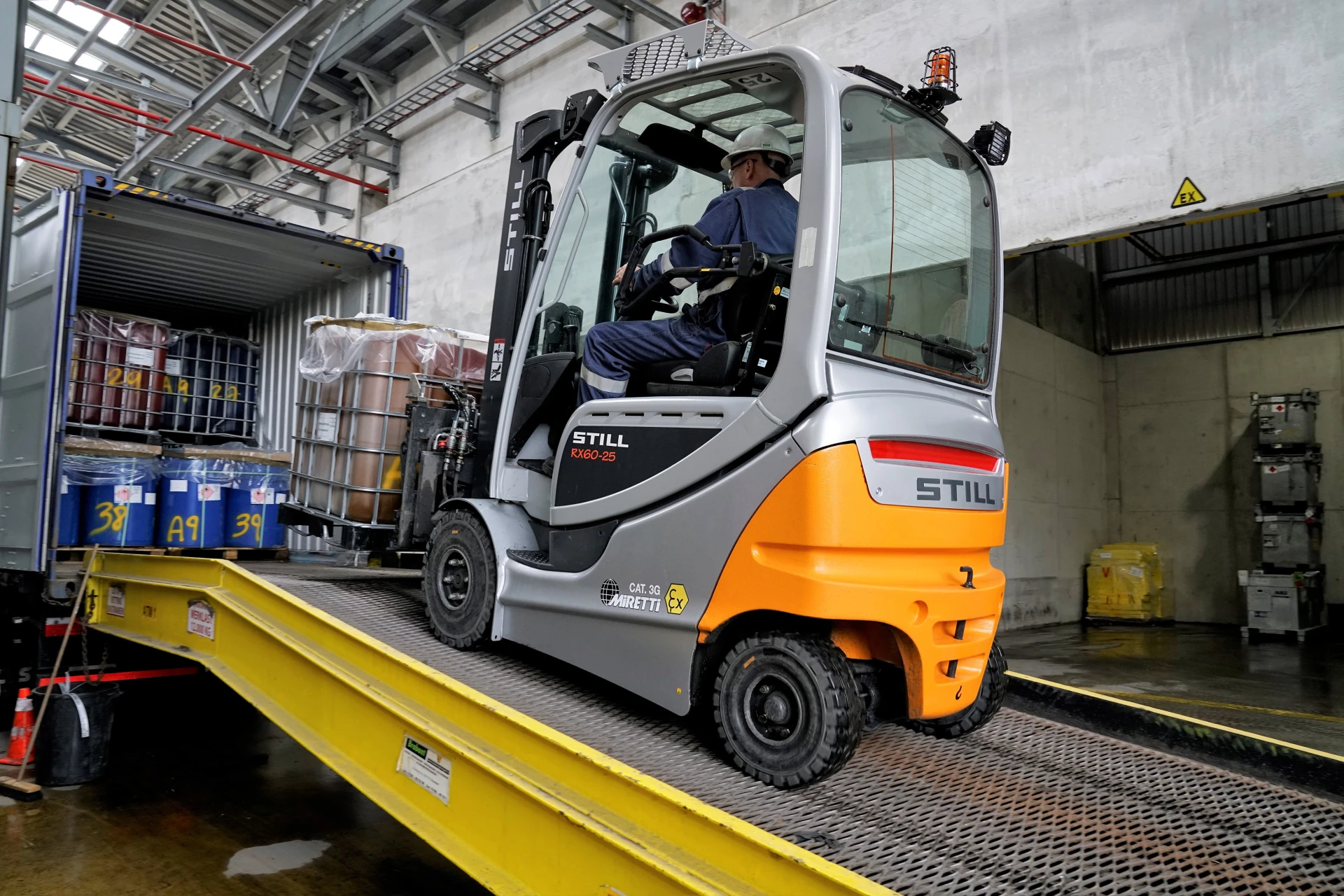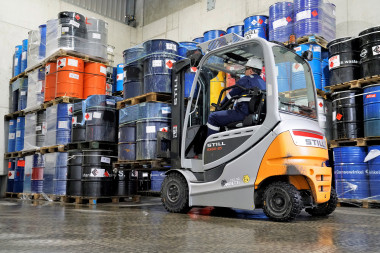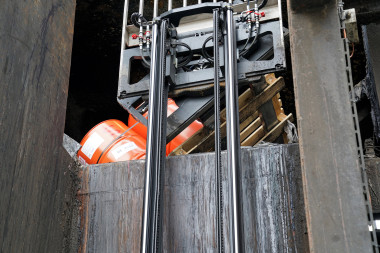When sparks may not fly.
RX 60 electric forklift trucks in Ex protection operation at ATM.
Sector: Recycling industry
Company: approx. 220 employees, revenue of approx. EUR 101 million (2017) Headquarters in Moerdijk, Netherlands
Challenges: Acceptance, storage and processing of 55,000 tonnes of packaged waste. New construction of 4900 m2 hall with ATEX zones which require specially certified trucks.
STILL products: 5x Ex proof RX 60-25 electric forklift trucks with a lifting capacity of 2.5 tonnes, 2x Ex proof RX 60-35 electric forklift trucks with a lifting capacity of 3.5 tonnes.

ATM has put seven new STILL RX 60 electric forklift trucks into operation at its new warehouse for packaged waste. The new trucks, designed with explosion protection, are perfectly suited to the elevated health and safety requirements at ATM.
With 216 employees, ATM processes 2 million tonnes of waste per year in Moerdijk (Netherlands) – from contaminated soil to chemical waste; oil sludge to sewage. Around 55,000 tonnes of this waste flow consists of packaged waste in drums, intermediate bulk containers (IBC) and canisters. The majority is collected waste from recycling centres, such as paint residue, adhesives, resins, grease and oil. ATM is building a brand-new 4900 m2 hall for the acceptance, storage and processing of this packaged waste.
“The newly constructed warehouse for packaged waste quadruples our storage capacity and enables us to feed our pyrolysis plant more regularly,” says Ben Hopmans, Health & Safety Manager at ATM. “The new building also gave us an excuse to improve the internal transport used in and around the warehouse.
From diesel to electro
The plant has larger sections where different classes of ADR-regulated goods contained in the packaged waste can be stored separately. Each section of the warehouse is equipped with state-of-the-art fire protection and extinguishing technology and has at its disposal a fully controlled collection and discharge system in the event of escaped liquids. In turn, ATM processes these liquids in its own sewage treatment facilities.
“When it comes to safety and working conditions we set the benchmark very high,” continues Ben Hopmans. “This is why we observe future thresholds for diesel emissions at our site. The new hall is no longer an open space, but a locked warehouse with no doors. We no longer wish to use diesel forklift trucks, even ones with a soot filter. However, due to the ATEX zones in the plant, regular electric forklift trucks are not suitable for this kind of changeover. A whole series of adaptations are necessary beforehand.”
All certification under one roof
After a thorough search of the market and a successful demonstration, ATM chose to source its new trucks from STILL Inland Transport; more specifically seven of the four-wheel RX 60 trucks – five 2.5-tonners and two 3.5-tonners. All the trucks have been adapted by Ex conversion specialists Miretti in Italy for use in ATEX zone 2. However, with the two 3.5-tonners, they have gone one step further. Owing to a higher lift mast, these trucks can feed the packaged waste into one of the two shredders in ATM’s pyrolysis plant. “There is an ATEX zone 1, above the filling hole when it is temporarily opened. STILL’s trucks must also fulfil these requirements,” says Ben Hopmans. The conversion of the trucks was performed in very close collaboration between STILL, Durwen (accessories) and Miretti. The RX 60 obtains all the necessary certification from the STILL plant in Hamburg and full liability for the products lies with STILL. This approach offers the end user more safety and clarity.
95% reusable
ATM has been in existence for 36 years and has been part of Renewi since 2017, the company derived from the merger between Shanks and Van Gansewinkel. In Moerdijk, ATM deals with five main waste flows: contaminated soil, packaged chemical waste, oil sludge, sewage and fumes, as well as ship-generated waste. Each year a total of 2 million tonnes is accumulated, of which 95% is reusable. The energy released in the cleaning process covers 75% of ATM’s own energy demand. The thermally cleaned earth is then used for road construction or for the cement and concrete industry. The water is suitable for processing in the local treatment plants, and the scrap metal that is a byproduct of packaged chemical waste can be reused for steel production.
All sources of risk eliminated
All possible dangers are completely eliminated during conversion. To this end, Miretti tests all potential sources of ignition and also protects warm surfaces. From switches to steering: sparks and heat must not be able to escape from anywhere. Electrical components are housed in a pressure-proof casing, so that no explosive gases can seep through and no sparks can get out. If there were to be an explosion in a component, the pressure-proof housing would contain it within the equipment. Further adaptations to the RX 60 trucks include conductive tyres, earthing of the battery compartment and a pneumatic, foot-operated horn. Additionally, all plastic components have been monitored for electrostatic charge. Where necessary, an anti-static coating has been applied.
All the necessary steps have also been taken for the fork carriage and its surrounding components. The rotating fork clamp from Durwen meets the requirements for explosion protection ex works. Among other things, the forks have a stainless steel casing so that no sparks are created if they strike against other materials or the ground. The rotating fork clamps are fitted with a worm gear direct drive as standard, as well as the patented ‘Slot & Key’ technology. This absorbs the lateral clamping force and allows the fork to be easily replaced, when necessary.
Easier to operate
“It was quite a transition for the drivers at first,” says Logistics Supervisor Niek Snelders, unloading two HGVs in the new hall. “They were used to loud diesel trucks and didn’t think that the electro trucks would deliver optimum performance. Now they know from experience that they can easily achieve capacity, and that everything runs a lot more smoothly.”
Snelders is not only referring to the lack of engine noise and vibrations, but also the smoother drive behaviour of STILL’s electric forklift trucks. When the new plant was constructed the floor was also improved, which means it is much easier to work on. ATM works around the clock, seven days a week, even if the new forklifts are doing two shifts: 06:00 a.m.–14:00 p.m. and 14:00 p.m.–22:00 p.m. In order to prevent downtime, replacement batteries have been supplied for every 2.5-tonner as well as for both 3.5-tonners.
“We run the batteries right down until the forklift itself tells us that it’s time to change them,” says Snelders at the loading station. “This is how we maintain a healthy store of batteries and the trucks remain in optimum operation. Because that’s what it’s ultimately all about: a safe and healthy workplace as well as the best possible handling of our waste flows.”



